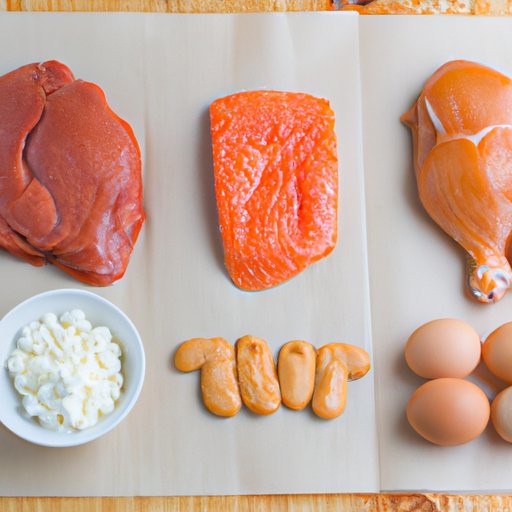
I. Introduction
Constipation is a common problem that affects millions of people worldwide. It is often associated with a diet low in fiber, inadequate hydration, and a sedentary lifestyle. However, some people experience constipation despite making efforts to adopt a balanced diet and lead a healthy lifestyle. For those who have turned to high-protein diets to lose weight or build muscle, constipation can be a common issue. This article explores the connection between protein and constipation, debunks myths, and offers tips on how to maintain healthy bowel movements while following high-protein diets.
II. The Truth About Protein and Constipation: Debunking the Myths
Several myths surround protein and its effects on the digestive system. Some individuals believe that protein is difficult to digest, lacks fiber, and dehydrates the body, leading to constipation. However, these claims are mostly inaccurate.
While it is true that protein requires more work for the body to digest than carbohydrates or fats, it is not necessarily hard to digest. Our body breaks down protein into amino acids, which are essential for building and repairing tissues.
Secondly, while it is true that protein lacks fiber, it is not the only nutrient responsible for maintaining regular bowel movements. A high-protein diet that includes fiber-rich foods such as fruits, vegetables, and whole grains can help prevent constipation.
Lastly, protein does not dehydrate the body. Instead, it is a high-protein diet that could increase the body’s need for water, leading to dehydration. Drinking sufficient water and fluids throughout the day and avoiding or limiting alcohol and caffeine intake can prevent dehydration and constipation.
III. Can Your High-Protein Diet Be the Cause of Your Constipation? Let’s Find Out
Research studies linking high-protein diets and constipation are limited. However, some studies suggest that a diet high in animal protein and low in fiber can slow down bowel movements and lead to constipation. A high-protein diet could also lead to a decrease in beneficial gut bacteria responsible for regular bowel movements.
Additionally, individuals who consume protein supplements like whey or casein powders can experience constipation due to the absence of fiber and other crucial nutrients found in whole protein sources like chicken, fish, and legumes.
IV. Protein Powders and Constipation: Exploring the Connection
Protein powders are an easy and convenient way to increase protein intake. However, some individuals experience constipation when using them. The primary reason for this is the absence of fiber in protein powders. They lack the natural sugars, fiber, and other nutrients found in whole food sources that promote optimal digestion and healthy bowel movements. Additionally, some powders might have added sugar alcohols or artificial sweeteners found to cause gastrointestinal distress in some people.
An alternative to protein powders is to opt for whole food sources like chicken, fish, and legumes. Alternatively, individuals can use protein powders that contain added fibers like psyllium husk or inulin, which are prebiotics that feed beneficial gut bacteria associated with healthy bowel movements.
V. How to Avoid Constipation While Following a High-Protein Meal Plan
The key to maintaining healthy bowel movements after a high-protein diet involves using the right strategy. The following tips can help:
High fiber foods: Incorporate fiber-rich foods like fruits, vegetables, and whole grains into your meals.
Fruits, vegetables, and whole grains: These foods contain essential vitamins, minerals, and fiber that keep the digestive system healthy.
Adequate hydration: Drink plenty of water or fluids throughout the day to avoid dehydration and constipation.
Adding supplements like probiotics to high-protein diets: Probiotics are beneficial bacteria that support gut health, promoting healthy bowel movements. They can be found in supplements or fermented foods like yogurt, kefir, and sauerkraut.
VI. The Pros and Cons of a High-Protein Diet: Is Constipation One of Them?
High-protein diets have been associated with several benefits, including appetite control, weight loss, and the preservation of muscle mass. However, they have also been linked with potential health concerns. For instance, excessive protein intake could lead to kidney damage, liver disease, and an increased risk of cancer. It could also cause constipation, as discussed in this article.
VII. Conclusion
While protein is an essential macronutrient needed for muscle building and repair, following an imbalanced high-protein diet can cause constipation. However, by incorporating whole food protein sources that contain fiber and adding supplements like probiotics to your diet, you can maintain healthy bowel movements while following a high-protein diet. If you experience persistent or severe constipation, you should speak to a healthcare provider.
In conclusion, by understanding the connection between protein and constipation, debunking myths, and following practical tips, individuals can maintain optimal health while following high-protein diets.





